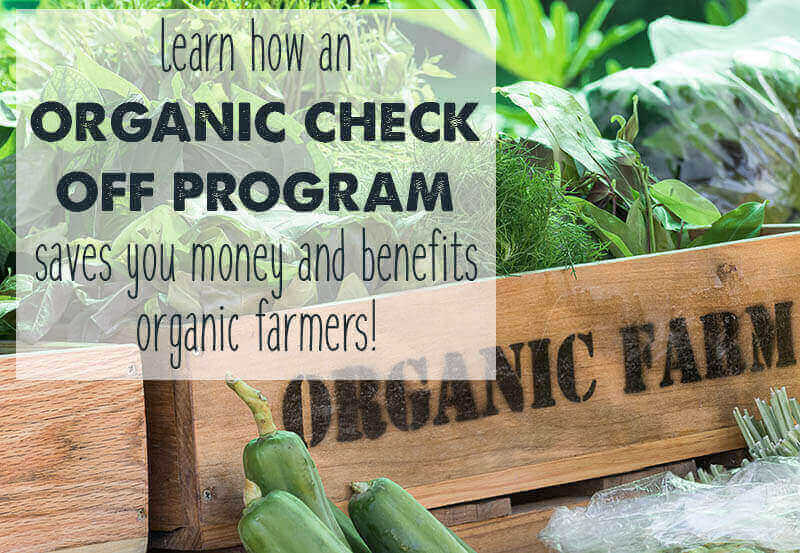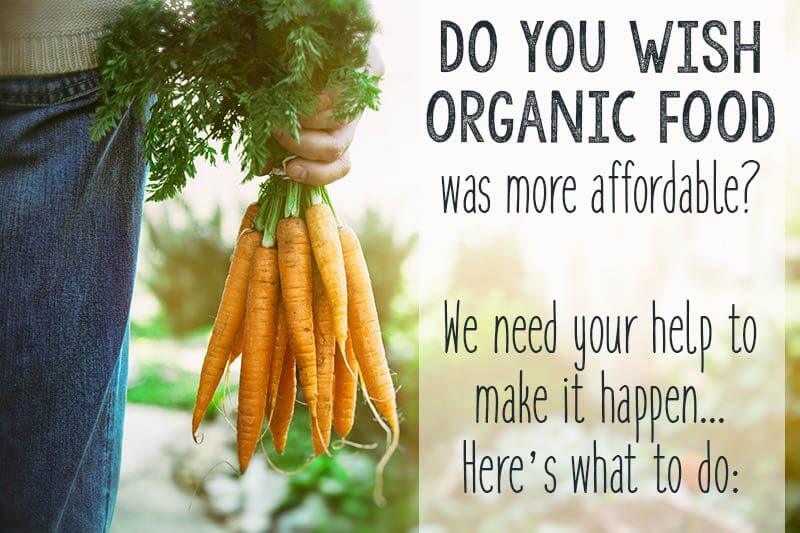Today’s post is going to differ slightly from my health and wellness articles, but it’s a topic that could affect all of us who are worried about the food supply and availability of organic foods for our families.
There’s a big new initiative on the horizon, and it affects a subject near and dear to my heart (and to many of yours as well, I’d wager):
How to get good food, and more of it, for less!
It’s called the GRO Organic Check-off Program, and it’s the next big thing in the organic food industry. In fact, this idea has been years in the making. This program means that organic food producers will work together to make organic food more widely available than ever before. It would mean lower prices for organic food while still ensuring that our organic farmers are being given the best tools to stay profitable, successful, and keep growing organic, while also driving down prices for consumers!
Sounds great, right? But organic farmers and the OTA (Organic Trade Association) need your support to make this plan a reality.
What’s a Check-off Program, Anyway?
Check-off programs in general are not exactly new. Does the phrase “Beef. It’s What’s for Dinner” sound familiar? Or maybe you’ve heard of the “The Incredible Edible Egg”? Check-off programs brought us these now famous advertising campaigns and very popular slogans.
The term “check-off” just means that producers of a certain type of food group (for example, all the beef producers) would check off a box indicating they wanted to participate in the program. They would then pay a fee toward the check-off fund. (Some check-off programs are in fact mandatory, which is controversial.)
These programs don’t promote one brand over another but the food commodity as a whole (eggs, beef, dairy, and now organics!).
An elected board puts the funds to work in a variety of ways. The check-off program handles education, marketing, advertising, strategic expansion into new markets, and so on. It’s worked wonders for many sectors of the food industry.
And it’s about to do the same for organic food, but only with our help!
Organic Check-off Program: Why The Time Is Now
American consumers clearly want organic food in their grocery stores. The Organic Trade Association (OTA) reports that this sector of the food industry has grown by double digits almost every year since the 1990s. Recent years are no exception, with a 10. 8% growth rate and a record $4.2 billion in sales in 2015. (Compare this to the overall food industry which grew at a rate of about 3% that year.)
While the demand is great, the supply is not. The same report tells us that as of 2014 only 1% of America’s farmland produced organic food. If you’ve dabbled in economics, you know that high demand and low supply drives up prices … as we all know too well when we’re trying to decide between conventional or organic at the grocery store.
Up until now, the organic food industry hasn’t had an official national check-off program. The OTA describes exactly why the industry should band together now at this critical point:
“We can either leave consumers guessing about what organic is, or we can come together to educate the public about what the organic seal really means. We can be solely dependent on others for research dollars to help solve industry challenges, or we can generate a pool of funds to help ourselves. We can struggle to meet the growing demand for organic, or we can work together to grow domestic acres and encourage more farmers to transition.”
In short, there’s no time like the present to make organically grown food more available and cost effective than ever and to make sure the farmers that grow our organic foods have all the resources available to stay in business and to expand!
What An Organic Check-Off Program Would Do for You
The GRO Organic Check-Off Program has 3 main goals:
- Encourage more farmers to enter the organic food sector
- Help all organic farmers be more successful and profitable
- Increase consumer confidence by educating about what the organic seal really means
It’s estimated that the program would raise $30 million dollars per year to use toward these goals. More specifically, a nationwide organic check-off program would raise money for the organic industry to:
- Distinguish organic from lesser claims and unregulated seals like “natural”
- Confirm the science behind the environmental and public health benefits of organic
- Undertake research to solve problems such as invasive pests and weed control
- Bring new farmers into organic production through information and technical assistance
- Reduce the supply crunch by transitioning farmland to organic production across the U.S.
Small organic growers would no longer have to struggle alone but would have the support of a coordinated, nationwide organization with their best interests in mind. (Importantly, small growers would be able to opt out of the program if it were not in their financial best interests.)
And all of this means we get to feel better about our choices in the grocery store.
How to Get Involved Today
For the next two months, the USDA is asking for public comments in the Federal Register on the proposal for the GRO Organic Check-Off Program. Anyone—consumers, business owners, or organic food producers—can comment to show public support for this initiative that promises to make organic foods better understood, more accessible, and less costly.
The comment is already provided for you if you wish, so it’s as simple as providing your name and address and clicking submit.
Still have questions about how the program would work? Check out these helpful FAQs with all you could ever want to know about the GRO initiative!
Ready to vote for a better food future? The USDA wants to hear your opinion! Between January 18, 2017, and March 20, 2017, you can influence this decision by entering your comment of support at www.groorganic.net. Use your power as a consumer and let your voice be heard!

Do you think an organic check-off program is a good idea? If you do, be sure to register your comment and ask others to do the same!


Leave a Reply